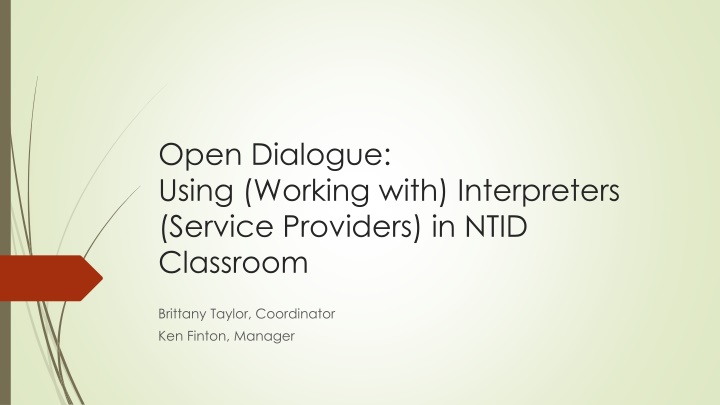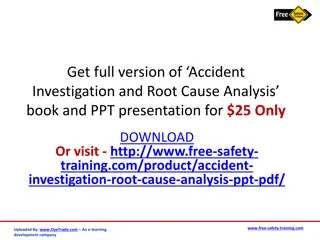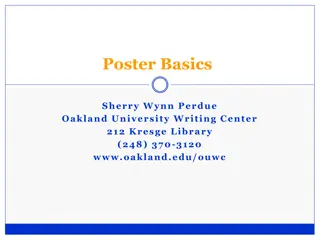
Implementing Access Services for NTID Classroom: Effective Strategies & Communication
Learn about the implementation of access services at NTID, including working with interpreters, principles of access allocation, and addressing classroom communication scenarios. Discover how students, instructors, and service providers collaborate for a successful learning environment.
Download Presentation

Please find below an Image/Link to download the presentation.
The content on the website is provided AS IS for your information and personal use only. It may not be sold, licensed, or shared on other websites without obtaining consent from the author. If you encounter any issues during the download, it is possible that the publisher has removed the file from their server.
You are allowed to download the files provided on this website for personal or commercial use, subject to the condition that they are used lawfully. All files are the property of their respective owners.
The content on the website is provided AS IS for your information and personal use only. It may not be sold, licensed, or shared on other websites without obtaining consent from the author.
E N D
Presentation Transcript
Open Dialogue: Using (Working with) Interpreters (Service Providers) in NTID Classroom Brittany Taylor, Coordinator Ken Finton, Manager
General Overview Your help and patience with this new initiative and transition period is appreciated. Thank you! We hit the ground running at the start of Spring Semester. Current Service Provision . Processed 40+ requests for Spring Semester Providing approx. 135+ weekly hours of Interpreting Support & 20+ weekly hours of Captioning Support (some captioning hours requires voice interpreting support) We value open dialogue and communication. We have had and continue to have open dialogue with .. NTID Counseling & Academic Advising group NTID Academic Chairpersons as a group Academic Chairpersons (11) Several respective NTID Departments All Core-Teams of Interpreters (120+) Provide periodic data/updates of Access Services provision to Chairs & Administration
What assumptions do you have with this new initiative to provide access services in NTID Classroom?
Access Allocated According To Principles Access to communication is a fundamental human right. DAS facilitates access to communication for the RIT community. Resources for Access Services is both limited and critical. Requests are considered on a comparative need basis. Academic Requests have the highest priority. Each request is considered individually on its own merits. Where judgments must be made, offering the most service to the greatest number of people is a priority. Access service is EVERYONE S concern.
Our Practice Cross-Registered and NTID students are required to request for access support on-line.(myaccess.rit.edu) Students responsible for all aspects of their request (ie. cancel, special presentations, change of location/time). Service providers confirms assignment with consumers. Service providers can be added to mycourses. The best outcome happens when students, instructors, and service providers maintain open dialogue and communication.
Comparing Classroom/Communication Scenarios NTID College Courses Cross-Registered Courses Majority in class deaf/hard of hearing. Majority in class is hearing. Instructors all hearing. Instructors deaf, hard of hearing, or hearing. Spoken Language is the norm. Interpreters work for maximum benefit for requestor(s) or all. Language/mode use is varied. Interpreters work for maximum benefit for requestor(s) and/or all.
Sample Issues/Concerns we have addressed Turn taking and student dialogue. Expectations regarding copy signing. The interpreter s role is to interpret, instructors must plan for copy signing or encourage direct line of sight of all students. Continue on with your natural way of instructing. How to handle missed information that needs to be repeated? Some misconceptions about captionist s role in the classroom. Captionists are hearing (not hard of hearing) and will require voice interpretation to be able to caption. Interpreter and captionist may need assistance from instructor if students create disturbance in the classroom that distrupts the interpreting or captioning process (i.e. loud headphones, music/sound from electronic devices).
Our best advice.. Students are and need to be responsible for communication related needs that they seek support for. Therefore, students are responsible for making such requests. All of us need to work together to maintain an open dialogue and communication with respect to Access Services.





















